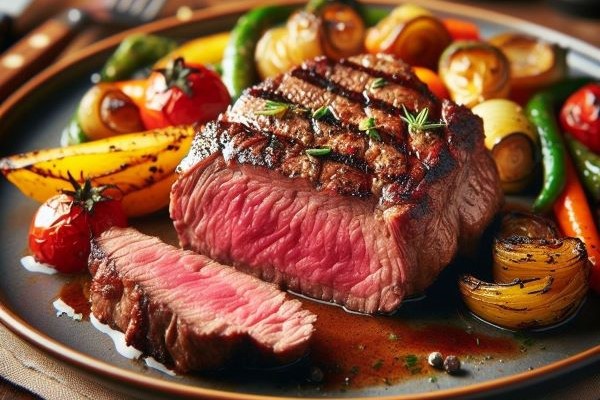I’ve been limiting my intake of meat for quite a while now. But I still enjoy it on occasion.
My absolute favorite is grass-fed New Zealand lamb. I pierce the top of the meat with a series of holes and fill each opening with a clove of garlic. Then, I cover the entire thing with organic ketchup to keep it moist and pop it into the oven.
It’s absolutely delicious. The garlic caramelizes, the ketchup keeps it moist and gives it a little shell. When you slice into it, the meat’s soft, rich, delicious and moist.
As tasty as it is, you probably wonder why I don’t eat it more often.
Well, when we eat animal products, we generate something called trimethylamine, or TMA for short. It doesn’t matter whether it’s meat, cheese, eggs or dairy.
Here’s how it works…
When we eat these foods, the bad bacteria in our guts convert choline, carnitine and other animal compounds into TMA. Then, when TMA goes from your gut to your liver via the portal vein it’s converted to TMAO (trimethylamine N-oxide).
The more animal products you eat, the more TMAO is generated… and the less able your kidneys are to get rid of it. So it starts building up. And you won’t believe how quickly it accumulates!
That’s terrible news for your cardiovascular health, because TMAO “inhibits cholesterol metabolism, induces platelet aggregation and thrombosis, and promotes atherosclerosis.”
This mean it can be a big factor in cardiovascular incidents, like heart attack and stroke.
TMAO promotes inflammation, plaque buildup in the arteries and “sticky” blood. These are all major factors in your chances of suffering a cardiovascular event. Even worse, higher TMAO levels produce more massive strokes of greater severity.
Just as bad – and maybe even worse – high TMAO levels are so detrimental to your heart that levels can predict your chances of heart failure, one of the leading causes of death worldwide.
As if that’s not enough, it is also hard on your kidneys. The more regularly you eat foods that contribute to TMAO, the greater your risk of developing chronic kidney disease.
It’s all About the Foods You Eat
What’s interesting is that vegans and vegetarians basically don’t have TMAO. This is why they’re generally healthier and not having cardiovascular events. (Well, unless they smoke, drink or eat a lot of sugar.)
What’s also interesting is we don’t know which bacteria causes it. But we do know that a vegan/vegetarian diet will generate more beneficial bacteria in your gut so that your body does not produce the TMA that produces TMAO.
And here’s something very interesting. If you go from an animal product diet to a vegan diet, it only takes a week or two for your TMA to drop to safe levels. Your kidneys will automatically start flushing those high levels of it out of your body.
Then, if you only eat animal products one day a week or so, your body won’t generate nearly as much of the bad bacteria that produce TMA. This means you could be a vegetarian or a vegan for six days of the week, then have your steak dinner – or your ham or turkey dinner – on Sunday.
So when you add in a meat-eating day, you’re not going to affect your gut too much.
How to Fast-Track TMAO Clearance
To speed up TMAO clearance even further, try adding more cold-pressed extra virgin olive oil, balsamic vinegar and red wine to your diet. These items are rich in something called DMB, (3,3-dimethyl-1-butanol) which helps to stop your gut bacteria from producing TMAO.
Resveratrol can also help. It not only inhibits TMAO production, it also helps thin out the sticky effect TMAO has on your blood. This, in turn, can greatly reduce your risk of a major cardiovascular event. I recommend at least 100 mg of resveratrol each day. Add 25 mg of pterostilbene (a close cousin to resveratrol) to help keep your TMAO levels in check.
Add a probiotic to your daily regimen. Look for a formula that contains a prebiotic along with multiple strains of lactobacillus, bifidobacteria and other healthy bacteria. The higher the colony count, and the more live strains involved, the better off you’ll be. Just make sure to take it daily with food.
By the way, it’s easy enough to get your TMAO levels tested. It’s a simple blood test that your doctor can order for you from Quest, Labcorp or another diagnostic lab.
SOURCES:
Zhen J, Zhou Z, He M, Han HX, Lv EH, Wen PB, Liu X, Wang YT, Cai XC, Tian JQ, Zhang MY, Xiao L, Kang XX. The gut microbial metabolite trimethylamine N-oxide and cardiovascular diseases. Front Endocrinol (Lausanne). 2023 Feb 7;14:1085041.
Li XS, Obeid S, Klingenberg R, Gencer B, Mach F, Räber L, Windecker S, Rodondi N, Nanchen D, Muller O, et al. Gut microbiota-dependent trimethylamine N-oxide in acute coronary syndromes: a prognostic marker for incident cardiovascular events beyond traditional risk factors. Eur Heart J. 2017 Mar 14;38(11):814-824.
Nam HS. Gut Microbiota and Ischemic Stroke: The Role of Trimethylamine N-Oxide. J Stroke. 2019;21(2):151-159.
Weifei Zhu, Kymberleigh A. Romano, Lin Li, Jennifer A. Buffa, Naseer Sangwan, Prem Prakash, Aaron N. Tittle, Xinmin S. Li, Xiaoming Fu, Charlie Androjna, Anthony J. DiDonato, et al. Gut microbes impact stroke severity via the trimethylamine N-oxide pathway. Cell Host & Microbe. Online June 2021.
Tang WHW, Lemaitre RN, Jensen PN, Wang M, Wang Z, Li XS, Nemet I, Lee Y, Lai HTM, de Oliveira Otto MC, Fretts AM, Sotoodehnia N, DiDonato JA, Bäckhed F, Psaty BM, Siscovick DS, Budoff MJ, Mozaffarian D, Hazen SL. Trimethylamine N-Oxide and Related Gut Microbe-Derived Metabolites and Incident Heart Failure Development in Community-Based Populations. Circ Heart Fail. 2024 Aug;17(8):e011569.
Tang WH, Wang Z, Kennedy DJ, Wu Y, Buffa JA, Agatisa-Boyle B, Li XS, Levison BS, Hazen SL. Gut microbiota-dependent trimethylamine N-oxide (TMAO) pathway contributes to both development of renal insufficiency and mortality risk in chronic kidney disease. Circ Res. 2015 Jan 30;116(3):448-55.
Wang Z, Roberts AB, Buffa JA, et al. Non-lethal Inhibition of Gut Microbial Trimethylamine Production for the Treatment of Atherosclerosis. Cell. 2015;163(7):1585-1595.
Chen ML, Yi L, Zhang Y, et al. Resveratrol Attenuates Trimethylamine-N-Oxide (TMAO)-Induced Atherosclerosis by Regulating TMAO Synthesis and Bile Acid Metabolism via Remodeling of the Gut Microbiota. mBio. 2016;7(2):e02210-e2215.
Din AU, Hassan A, Zhu Y, Yin T, Gregersen H, Wang G. Amelioration of TMAO through probiotics and its potential role in atherosclerosis. Appl Microbiol Biotechnol. 2019 Dec;103(23-24):9217-9228.



